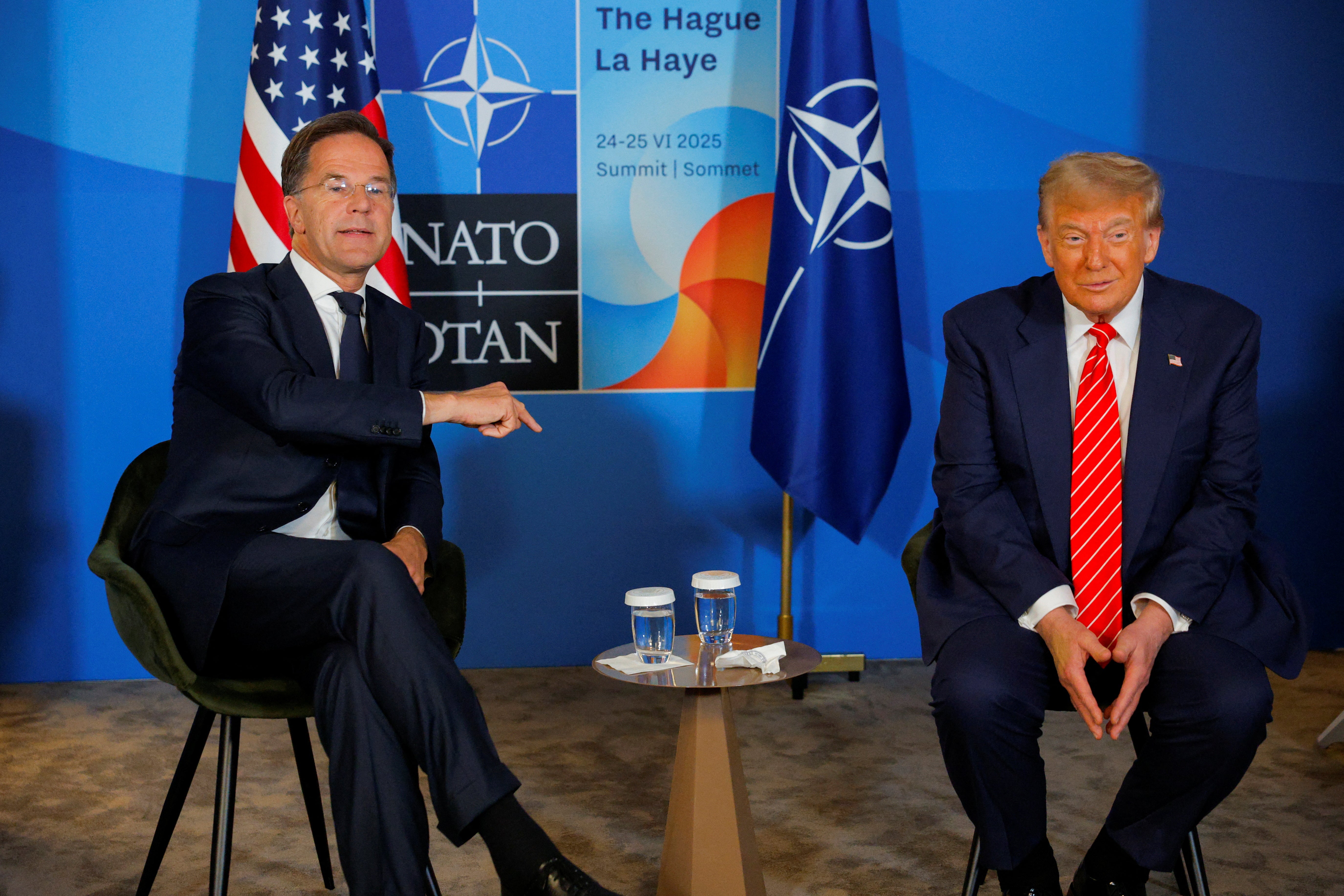President Donald Trump is standing by his claim to have completely destroyed three Iranian nuclear facilities over the weekend, despite a U.S. intelligence assessment that says the attack only inflicted enough damage to set Iran’s nuclear weapons program back by a few months.
Speaking with NATO Secretary-General Mark Rutte in The Hague, Trump was asked to respond to media reports about a leaked Defense Intelligence Agency analysis suggesting that the 30,000 bunker-buster bombs dropped by B-2 planes did not destroy the underground Fordow enrichment facility, where Iran was feared to be enriching uranium to weapons-grade purity.
He replied: “We hear it was obliteration. It was a virtual obliteration.”
The president also said he was waiting to hear more from the Israeli government’s own intelligence estimates and suggested that Iran had not had time to remove any of their uranium supplies from Fordow or other facilities.
At that point, he ceded the floor to Defense Secretary Pete Hegseth, who claimed the Massive Ordinance Penetrator weapons dropped on Saturday had “landed precisely where they were supposed to” during the “flawless” mission.
The attack provided “devastation underneath Fordow” and the other targeted facility, the secretary added.
The former Fox News presenter then pivoted to attacking the motives of the Defense Intelligence Agency analysts who’d written the assessment by telling reporters that anyone who would say anything except echo his claims was “speculating with other motives” while simultaneously deriding the report as “low confidence.”

The damage to the facility was “moderate to severe, and we believe far more likely severe and obliterated,” he said, adding that the intelligence estimate was likely done with a “political motive.”
“We're doing a leak investigation with the FBI right now because this information is for internal purposes, battle damage assessments, and CNN and others are trying to spin it to make the president look bad when this was an overwhelming success,” Hegseth added.
Trump jumped back into the fray by calling the mission “an unbelievable success” and accusing the press of being “really demeaning to the pilots and the people that put that whole thing together” before describing the strikes as a “perfect operation.”
Then it was the turn of Secretary of State Marco Rubio, who attacked the U.S. intelligence community and the motivations of whoever leaked the DIA assessment to the press.
“This is what a leaker is telling you. They read it, and then they go out and characterize it the way they want it characterized. And they're leakers. This is the game they play,” said Rubio, who is also serving as Trump’s acting national security adviser.
He also claimed that U.S. officials can no longer see where the targeted Iranian facilities were on account of the damage inflicted by the strikes over the weekend.
“You can't even find where it used to be, because the whole thing is just blackened out. It's gone. It's wiped out. It's wiped out,” he said before returning to attacking whoever leaked the damage report.
“This leaker stuff, these leakers are professional stabbers. That's what they are. They go out and they read this stuff, and then they tell you what it says ... but they characterize it for you in a way that's absolutely false,” he said.
When asked to clarify whether the Pentagon’s assessment was accurate or not, Trump replied that the Defense Intelligence Agency report was “very inconclusive” and complained further about the press reporting on the attacks not including fulsome praise for the pilots involved in Saturday’s action.
“The intelligence says we don't know it could have been very severe. That's what the intelligence says. So I guess that's correct, but I think ... we don't know,” he said. “It was very severe. It was obliteration. And you think that a media outlet would say, ‘isn't that a great thing?’”
The contentious exchange with reporters over the extent of damage to Iran’s nuclear facilities came as Trump and Rutte met at the start of the president’s appearance at this year’s NATO summit.
Trump has long had a skeptical view of the 75-year-old defensive alliance dating back to his first term in the White House and his first visit to the annual gathering, when he castigated NATO members for not paying “their fair share” by spending at least two percent of their respective countries gross domestic product on defense.
He has even gone so far as to threaten to withhold support from any country that doesn’t meet that target and has cast doubt on America’s commitment to Article Five of the North Atlantic Treaty, which states that an attack against one member is considered an attack against all of the organization’s 32 member nations.
Aboard Air Force One during his flight from Washington to The Netherlands on Tuesday, he refused to state whether he would commit the United States to continued support of the mutual defense provision, which has only been invoked once in the alliance’s history — after the September 11, 2001 terror attacks on New York and Washington.
But as he sat next to Rutte, he appeared to backtrack on his skeptical comments when asked about his view of Article Five, telling Rutte and the assembled reporters: “We’re with them all the way.”
Iran’s desire for nuclear weapons has only been spurred on by US strikes – no matter what Trump says
Business news live: Oil prices latest as FTSE 100 rises, UK pay slows below inflation
Iran-Israel latest: Trump compares US strikes on nuclear sites to Hiroshima bombing
Ukrainian lawmaker withdraws nomination for Trump to receive Nobel Peace Prize







